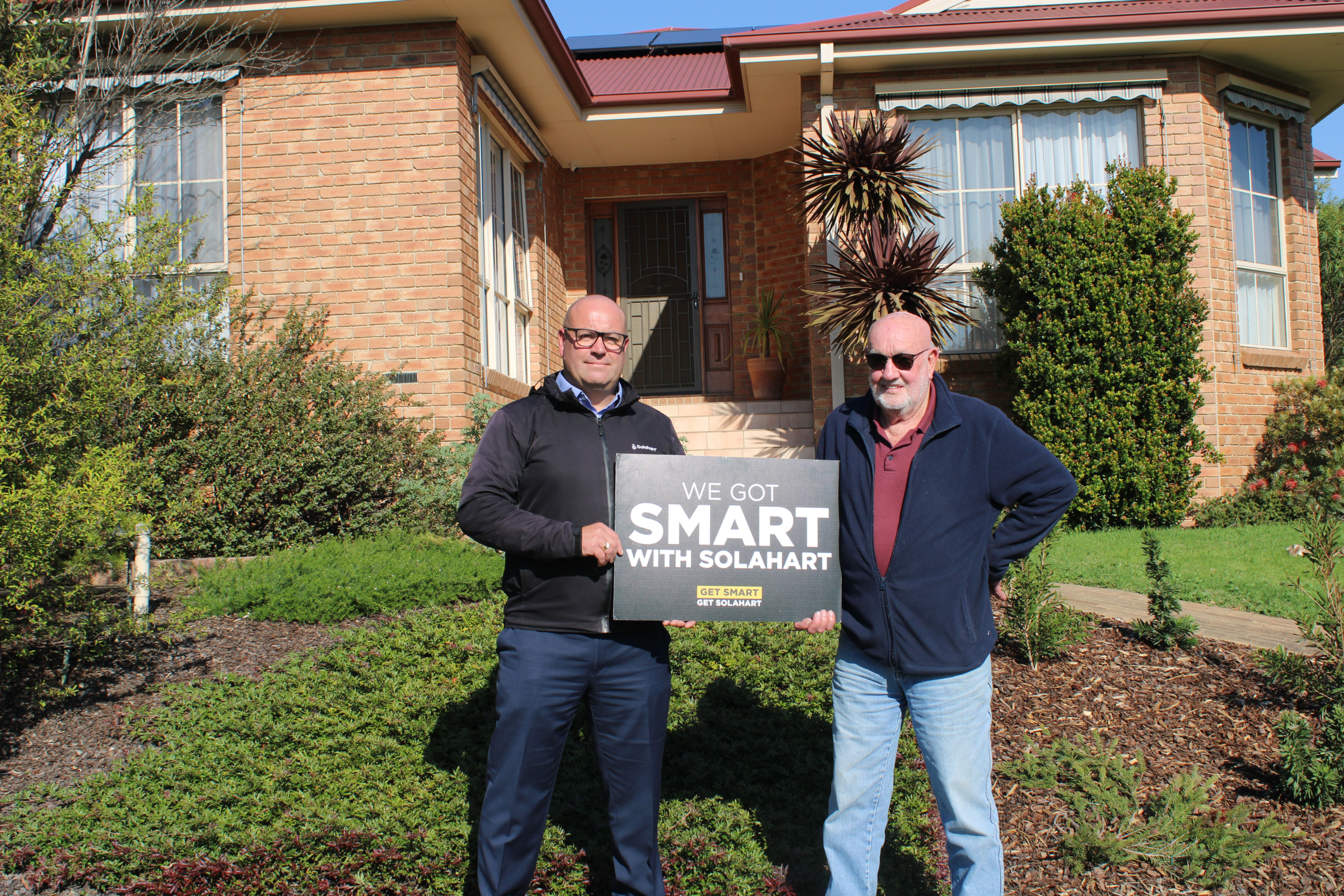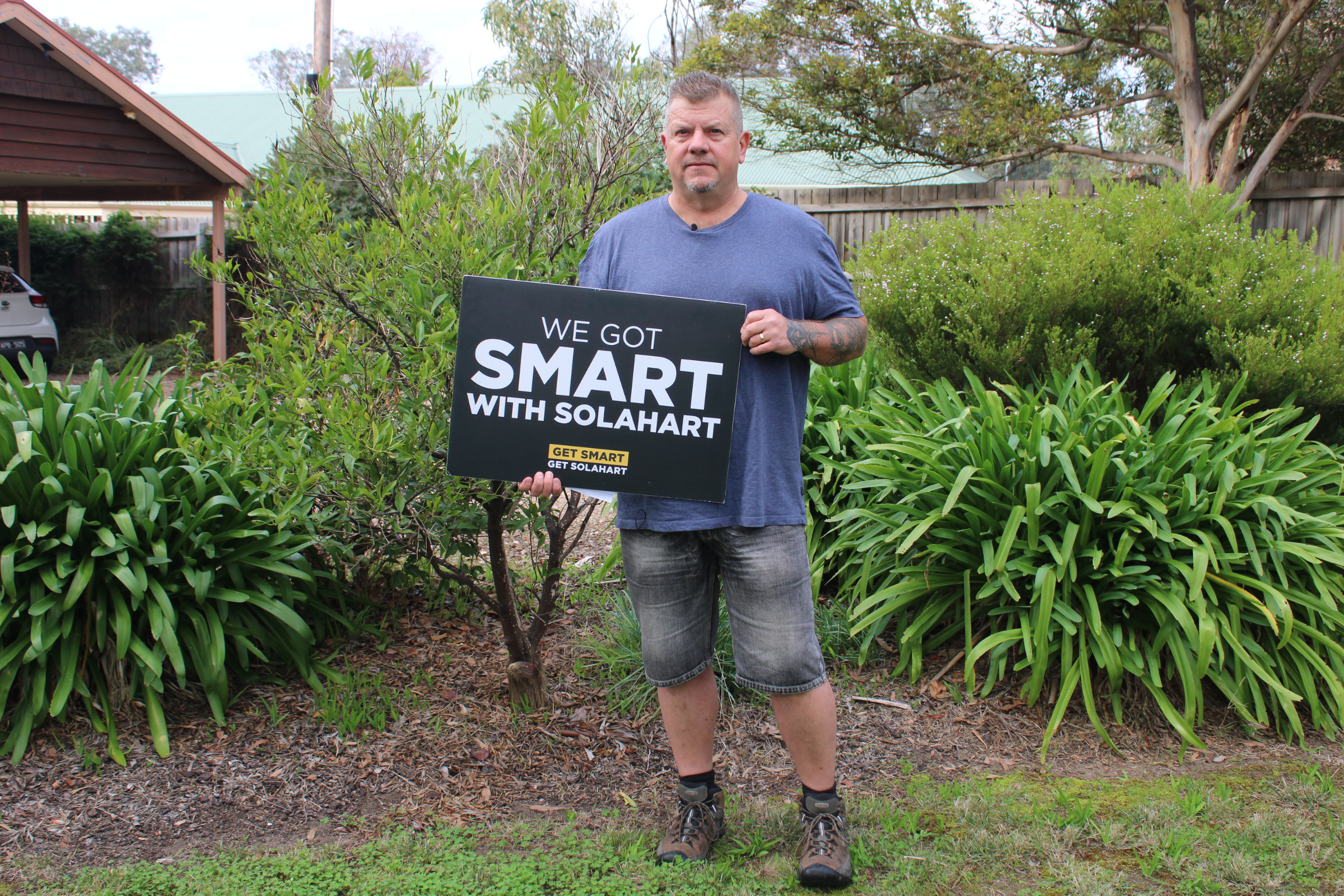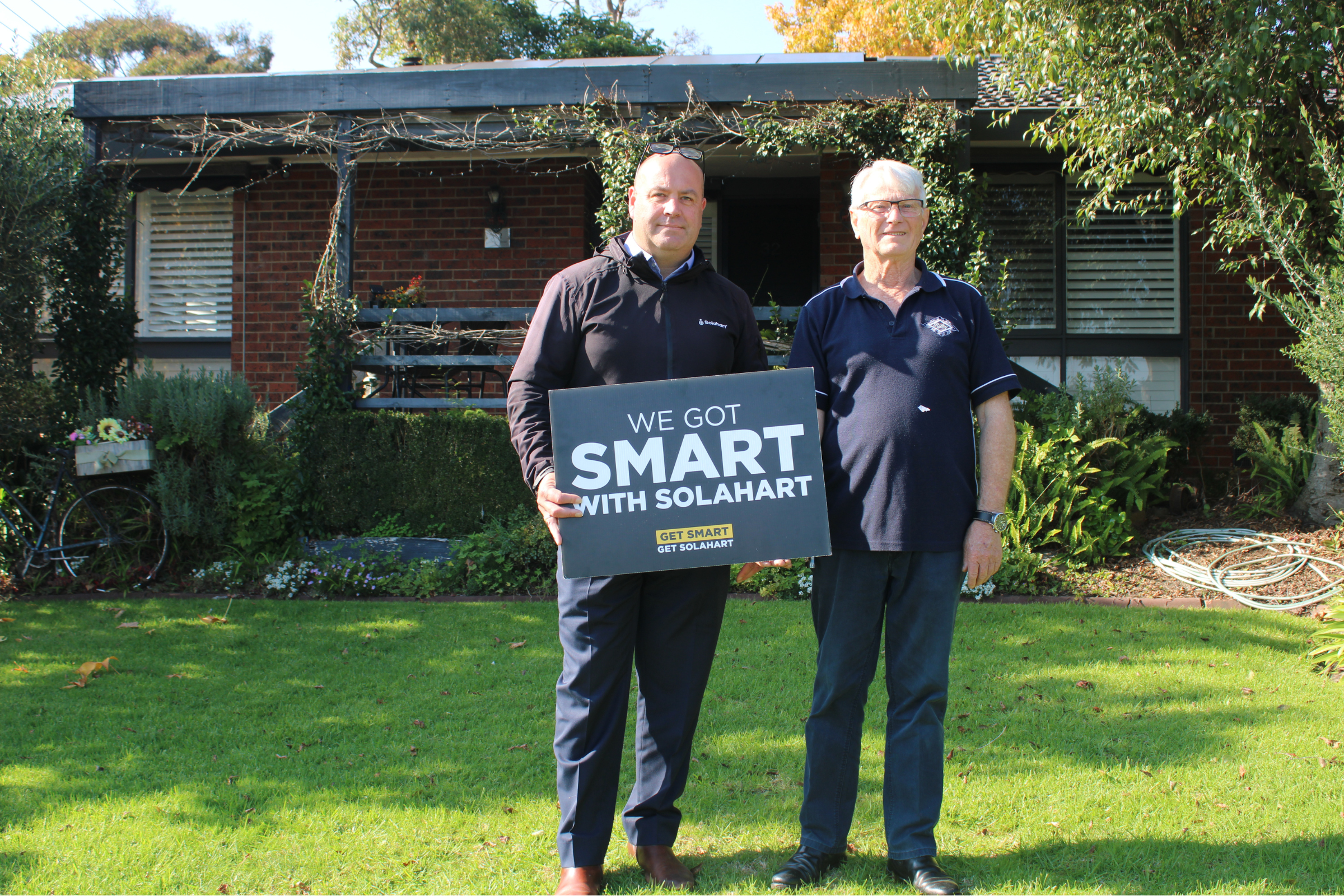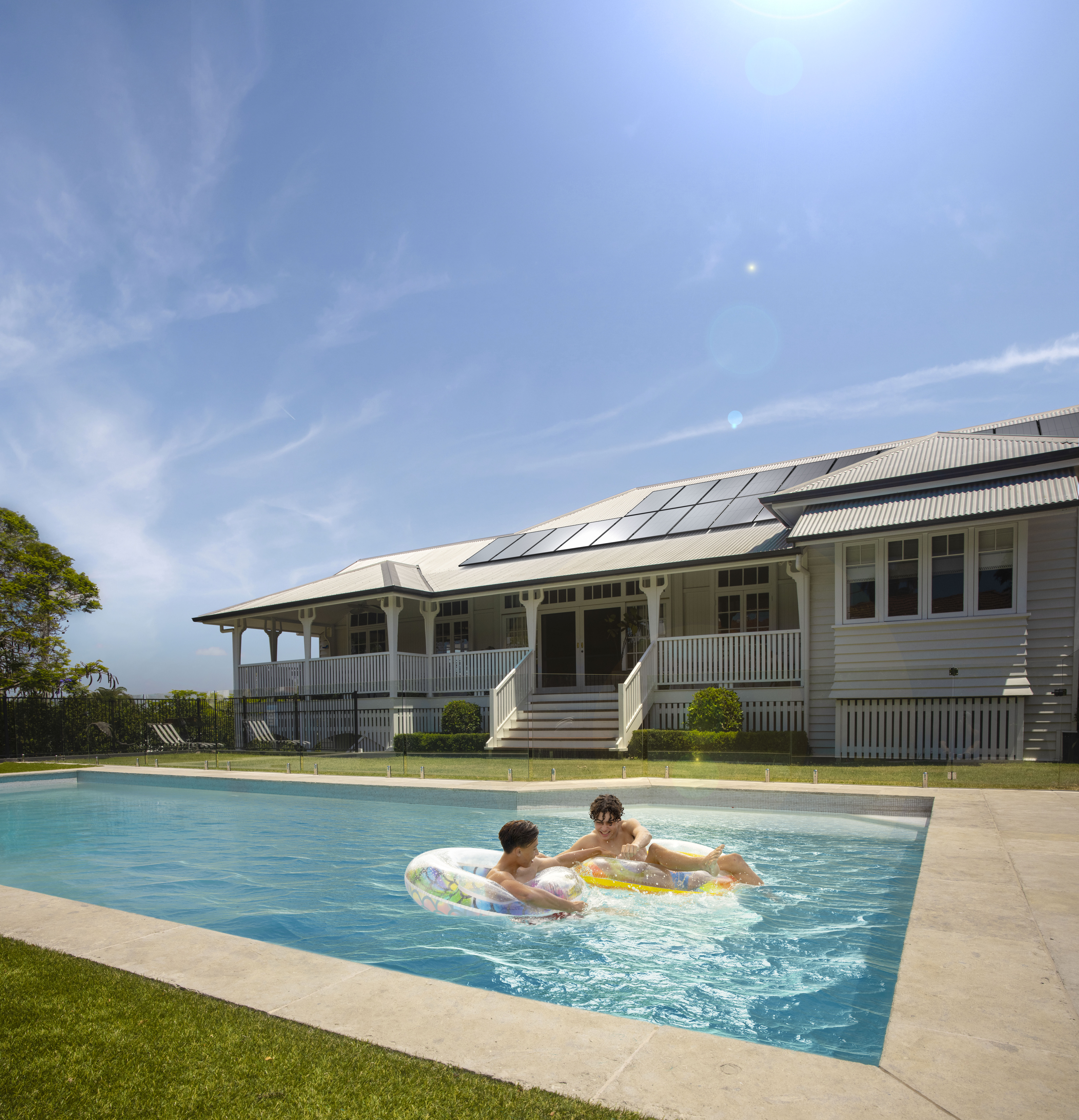A Smart Choice for Your Home, Budget, and the Planet.
Thinking about switching to solar? You’re not alone. More Australians are making the move to solar energy every year — and with good reason. At Solahart, we make it easy to take advantage of the sun with industry-leading solar power systems, solar hot water solutions, and battery storage options.
Here’s why going solar with Solahart is one of the smartest investments you can make:



Want to learn more about solar?
General Benefits
-
What are the benefits of switching to solar energy for my home or business?
Switching to solar energy is a smart investment in your future as it offers long-term savings on energy bills, increased energy independence, and a significant reduction in carbon emissions. Whether it's solar power or solar hot water, these systems help you take control of your energy use while supporting a cleaner environment.
-
How does solar energy help reduce electricity bills?
Solar energy technologies, such as solar power systems and solar hot water systems, reduce your reliance on grid-supplied electricity or natural gas. By using Energy Free From the Sun®, you can significantly reduce ongoing energy costs.
-
What are the environmental advantages of using solar energy systems?
Solar energy is a clean, renewable resource that reduces greenhouse gas emissions and dependence on fossil fuels. Whether you're powering your home or heating water, using solar helps reduce your carbon footprint.
-
Is solar energy suitable for all types of homes and businesses?
Most properties can benefit from solar energy, but suitability depends on factors like roof space, shading, orientation, and energy usage patterns. A professional assessment can help identify the best solar solution for your needs — be it solar power, solar hot water, or both.
-
What types of solar systems are available for Australian households and businesses?
The most common systems are solar power (PV systems), solar hot water systems, and heat pump water heaters. These can be installed individually or in combination to maximise energy savings.
- Solar power systems (also known as PV systems), which generate electricity
- Solar thermal systems, which use the sun to heat water
- Heat pump water heaters, which use the heat in the air to heat water
Some households also install energy storage or combine multiple solar solutions for greater efficiency and savings.
-
How do heat pump water heaters compare to solar hot water systems?
While solar water heaters rely on sunlight to heat water, heat pumps draw heat from the air and can operate day or night. Both are renewable technologies that can reduce your water heating costs, and the best choice depends on your climate, roof space, and household needs.
-
Can I install a heat pump hot water system if my roof isn’t suitable for solar?
Definitely. Heat pumps are ground-mounted and don’t require roof space, making them an ideal alternative for homes where solar hot water systems aren’t viable.
-
Do I still get a feed-in tariff with solar energy?
Yes, most households with solar power systems receive a feed-in tariff, which is a small payment for any excess electricity sent back to the grid. However, feed-in tariffs have decreased over time and are no longer the primary reason people choose to save with solar. The most significant savings come from using the electricity you generate during the day, which reduces your need to buy expensive power from the grid.
Government Incentives & Rebates
-
What solar rebates and government incentives are available in Australia?
The Australian Government offers incentives such as Small-Scale Technology Certificates (STCs), which help reduce the upfront cost of eligible solar power and solar hot water systems. Some states also offer additional rebates or programs.
-
How do Small-Scale Technology Certificates (STCs) reduce the cost of solar?
STCs are part of a national scheme that rewards the installation of approved solar technologies. The value of the certificates is calculated based on your system size and location and is typically applied as a discount at the time of purchase, helping make solar systems more affordable from day one.
-
Are there additional state-based solar incentives and rebates?
Yes. In addition to federal support, some states and territories offer extra rebates or interest-free loans for solar energy systems, including solar power, solar hot water, and battery storage. Availability and eligibility criteria vary by location.
-
What battery rebates are available for solar energy storage in Australia?
Several state and federal programs are beginning to offer rebates or financial support for installing battery storage systems. These can help reduce the upfront cost and make energy storage more accessible to households with solar.
-
Can I add a solar battery to an existing system and still claim a rebate?
Yes, some rebate programs support retrofitting batteries to existing solar power systems. However, eligibility may depend on system age, capacity, and local program rules.
-
Are heat pump hot water systems eligible for solar rebates in Australia?
Yes. Most heat pumps qualify for Small-Scale Technology Certificates (STCs), making them more affordable through upfront discounts. Additionally, some states have extra rebates on heat pumps.
Learn more.
-
How do I claim solar rebates or incentives in Australia?
In most cases, your local Solahart Dealer will manage the rebate process for you, applying any eligible incentives as an upfront discount. This makes going solar easier and ensures you get the maximum benefit.
Battery Storage & Government Support
-
What battery rebates are available for solar energy storage in Australia?
Some state and federal programs offer battery rebates, including fixed-amount rebates or incentives based on battery size. These programs help reduce the cost of adding battery storage.
-
Do I need solar panels to be eligible for a home battery rebate?
Generally, yes. Most rebate schemes require the battery to be installed alongside a new or existing solar power system.
-
How much can I save with a solar battery rebate in Australia?
Rebates vary by location and battery size but can reduce upfront costs by thousands of dollars. Some programs offer up to $5,000 or more for eligible households.
-
How do I apply for a home battery rebate or government incentive?
Most programs require you to use an approved installer who will guide you through the application process and ensure your system qualifies. At Solahart, we are happy to do this.
-
Can I add a solar battery to an existing system and still claim a rebate?
Yes, some rebate programs support retrofitting a battery to an existing solar system. Check the program's eligibility criteria, as they can vary.
Installation & Maintenance
-
What should I consider before installing a solar energy system?
Key factors include your current energy use (electricity and hot water), roof size and orientation, local climate, and budget. Your local Solahart Dealer can help design the most suitable solution for your home, whether it's solar power, solar hot water, or a combination of both.
-
Do solar power and solar hot water systems work in all Australian climates?
Yes. Solar power and solar thermal systems are designed to perform efficiently across a wide range of Australian conditions — from hot, sunny areas to cooler climates. Even on cloudy days, solar systems can continue to provide benefits.
-
How long do solar energy systems last in Australia?
High-quality solar power and solar hot water systems are built to last 10–30 years or more. Longevity depends on the type of system, component quality, and regular maintenance. Choosing trusted brands and experienced installers is also essential for long-term reliability and performance.
-
What maintenance is required for solar panels and solar water heaters?
Maintenance is generally minimal. Occasional cleaning and professional inspections help ensure optimal performance. Heat pumps and solar hot water systems may require periodic servicing as recommended by the manufacturer.
-
What warranties should I look for when buying solar energy systems?
Look for warranties that cover performance and product integrity, including those for solar panels, inverters, hot water tanks, collectors, and installation workmanship. Longer, comprehensive warranties often reflect higher product quality.
Energy Efficiency & Integration
-
How can solar energy systems increase my energy independence?
By generating and using your own renewable energy, you reduce your dependence on grid power and external energy providers. Adding a battery or using energy-efficient appliances further boosts your independence.
Solahart PowerStore®, Australia’s first solar-smart electric water heater, helps increase independence even further by storing excess solar energy as hot water, reducing demand on your battery or grid supply.
-
What is the difference between solar power and solar hot water systems?
Solar power systems generate electricity using photovoltaic (PV) panels, which can power appliances throughout your home. On the other hand, solar hot water systems utilise the sun's heat to directly warm water. Since water heating accounts for approximately 25% of your electricity consumption, these systems can significantly reduce energy costs. While both types of systems help lower your energy bills, they serve different purposes.
-
Can solar energy help reduce my hot water costs?
Yes. Water heating is one of the largest energy users in Australian homes. Using solar hot water or heat pump systems can significantly reduce these costs.
Systems like Solahart PowerStore® use excess solar energy to heat water during the day, helping you get more value from your solar investment while cutting water heating costs.
-
Are solar hot water and heat pump systems more efficient than electric or gas water heaters?
Yes. Solar and heat pump water heaters are much more efficient than traditional electric or gas systems. They use renewable energy or ambient air heat, resulting in lower running costs and emissions.
-
Can I combine solar power and solar water heating systems for more savings?
Absolutely. Combining systems maximises your energy efficiency, helps lower both electricity and hot water costs, and allows you to make the most of your roof space.
Heat Pumps as an Energy-Efficient Alternative
-
What is a heat pump hot water system and how does it save energy?
A heat pump hot water system extracts heat from the air and uses it to heat water, much like a reverse-cycle air conditioner. It’s up to 3–4 times more efficient than traditional systems.
-
How do heat pump water heaters compare to solar hot water systems?
Heat pumps don’t require roof space and work well in shaded or cooler areas. Solar hot water is ideal for sunnier climates. Both are energy-efficient and may suit different homes.
-
Are heat pump hot water systems eligible for solar rebates or government incentives in Australia?
Yes. Most heat pumps qualify for Small-Scale Technology Certificates (STCs), making them more affordable through upfront discounts.
-
Do heat pumps work efficiently in colder Australian climates?
Modern heat pumps are designed to operate effectively even in cooler temperatures. Some include backup elements to ensure consistent performance year-round.
-
Can I install a heat pump hot water system if my roof isn’t suitable for solar?
Yes. Heat pumps are ground-mounted and don’t need roof panels, making them a great alternative for homes without suitable roof space.



